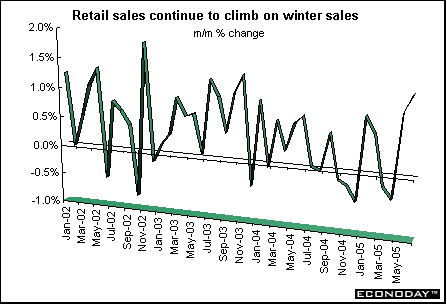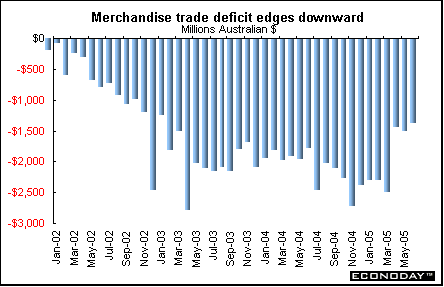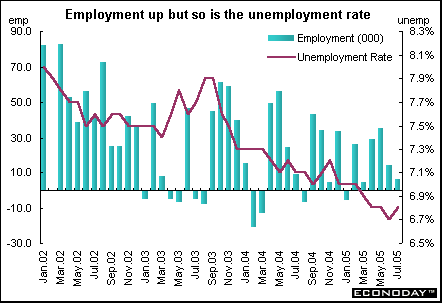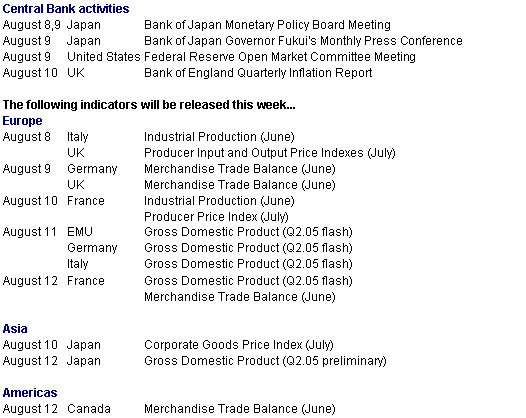Monday, August 8, 2005

Global Markets
Many world equity indexes soared to new multi-year highs last week, but on Thursday they staged a broad retreat as profit taking was sparked by mildly disappointing corporate news and rallying oil prices. Decisions by the European Central Bank to leave interest rates unchanged and by the Bank of England to cut rates by 25 basis points were widely expected and had little impact on the markets. The recent rally has been fueled by earnings. On Friday, after the stronger U.S. employment situation report, equity investors fretted about the impact of higher interest rates on their holdings and sold stocks. The strong report was seen as making it certain the FOMC would increase rates again on Tuesday (although this was a certainty before the report). Earnings disappointed and pushed European stocks down while in Japan stocks dropped amid the political uncertainty about the upper house vote on postal service reforms. The dollar sank against the euro and the yen.
Crude oil prices were on the rise again last week and moved towards new highs on lingering concerns about the ability of the U.S. refinery system to produce more refined petroleum products to meet consumer demand. A series of unscheduled maintenance work programs by several refiners last week will reduce capacity and has put more pressure on a refining system that is already operating close to its capacity.

Global Stock Market Recap

Europe and Britain
After reaching three-year peaks earlier in the week, European equity markets dropped sharply on Thursday and Friday as profit taking was ignited by a number of prominent corporate earnings disappointments. Financial stocks were among those losing ground. For example, the banking sector was subdued after earnings from Royal Bank of Scotland missed expectations. And Munich Re, the world's biggest reinsurer, reported that second quarter net profit sank nearly 74 percent after it was forced to boost reserves at its American Re unit and after a one-time tax charge. Total, the world's fourth-largest oil company, said second quarter net profit jumped 33 percent thanks to record high crude prices - but this was in line with expectations and the stock dropped. Disappointing earnings from BMW were a negative there. On Friday, chemical producers including Bayer AG and Imperial Chemicals Industrial Plc declined as investors worried about the potential impact of ever rising energy prices on their profits. The better-than-expected employment situation report from the U.S. also depressed investors Friday - the report merely confirmed that interest rates would continue to climb, potentially affecting corporate profits and consumer spending. Both the CAC and DAX declined last week.

The FTSE was more resilient than its counterparts in France and Germany. Markets were relatively unmoved by the Bank of England's decision to cut UK interest rates. However, banking stocks such as the Royal Bank of Scotland, for several years regarded as one of the more bankable stocks on the FTSE, dropped after its interim results met with an unenthusiastic response. The FTSE ended the week above the 5,300 level.
ECB keeps rate at 2 percent
As expected, the European Central Bank Governing Council left its key interest rate unchanged. The ECB has maintained the 2 percent rate since June 2003. Inflation continues to be stubborn, hovering at or above the ECB target of 2 percent. And M3 growth was up over 7 percent compared with the Bank's target of 4.5 percent for the three-month moving average. With the euro declining in value, manufacturing is beginning to show signs of recovery according to the latest PMI survey. Other surveys have indicated better sentiment as well. The ECB held their meeting by teleconference. The Governing Council does not meet at the Bank's Frankfurt headquarters in August. No press conference was scheduled after the meeting.
Even as eurozone governments plead with the European Central Bank for a rate cut to spark their stagnant economies, they are at the same time tying the ECB's hands by raising taxes, which in turn is adding to inflationary pressures. Annual inflation is above the ECB's target of just under 2 percent and tax increases being put in place or proposed in several countries threaten to drive it even higher. The tax increases stem from countries' burgeoning spending and budget deficits, despite EU rules that limit government spending. Several governments facing budget gaps are choosing to increase revenue via the tax route rather than cut costs. But the new taxes, primarily on consumer goods, also increase the possibility that labor unions will demand and get wage raises to compensate for the increased cost of living. That would further entrench inflation and is likely to prompt the ECB to keep rates higher than it otherwise would. The countries who have enacted them already include Greece and Portugal - they increased their value added tax. Germany also could increase their VAT after September's general election.

Bank of England lowers rate to 4.5 percent
Interest rates in the UK went in the opposite direction of those in the U.S. and declined for the first time in more than two years. The Bank of England reduced its policy rate by 25 basis points to 4.5 percent at their Monetary Policy Committee meeting on Thursday. The move had already been priced into the financial markets and there was virtually no reaction to the rate reduction.
There were a number of issues contributing to the move. Second quarter gross domestic product grew at its slowest pace since 1993. Consumer spending, which has fueled 52 straight quarters of growth, has been sapped by a laundry list of afflictions including stagnant housing prices plus higher borrowing costs, oil prices above $60 a barrel and rising unemployment. Gross domestic product grew 1.7 percent in the second quarter from a year earlier compared with 2.1 percent in the previous quarter.
U.K. borrowing costs remain the highest among the Group of Seven nations. The Bank of England increased the repurchase rate five times between November 2003 and August 2004. The decision to hold rates in July was carried by a margin of one, with four members of the rate-setting panel voting for a cut. The minutes for last week's meeting won't be released until August 17th. Deputy Governor Rachel Lomax noted in a speech earlier this year that almost two-thirds of rate moves since 2001 have come in the same month as the quarterly Inflation Report is published. The next report, which will contain forecasts for growth and inflation, is due for release on August 10th.
Asia/Pacific
Japanese stocks wilted under the strain of political uncertainty last week. Investors there are concerned about a possible political crisis if the postal privatization bill fails to be passed in the upper house next week. Prime Minister Junichiro Koizumi has threatened to resign and call a snap election if the upper legislative house does not pass his post office plan. The vote was postponed until this week to give the leading Liberal Democratic Party more time to garner the necessary votes and dissuade the prime minister from calling an election if the bill does fail. Both the Nikkei and Topix were down on the week.

As a signal that deflation might be coming to an end, the average price of Tokyo residential property was up in 2004 for the first time in 13 years. The survey released by the National Tax Agency, which measures the average value of land along large roads in residential areas, showed an increase in the Tokyo prefecture of 0.4 percent to ¥460,000 per square meter. Prices in central Tokyo increased by 0.9 percent to ¥593,000. However, nationwide prices continued to drop, falling 3.4 percent to ¥112,000 ($998). It was the sharp drop in land prices during the 1990s that severely damaged the economy and wrecked havoc on the banking sector. The average value of Japanese residential land fell 33 percent in the 15 years to March 2005, according to calculations by the Real Estate Economic Institute and Credit Suisse First Boston. In six big cities including Tokyo, the drop averaged 65 percent, while commercial land prices slumped 87 percent. Office rents in central Tokyo are now lower than in London's financial and commercial centers.
Other Asian/Pacific markets followed here were also down last week with the exception of the Hong Kong Hang Seng, which seems to have been rejuvenated over the past month despite the promise of higher interest rates. The Hong Kong dollar is pegged to the U.S. dollar. This means that interest rate increases in the U.S. are also passed on by the Hong Kong Monetary Board to borrowers in Hong Kong.
The RBA keeps rates unchanged
The Reserve Bank of Australia kept its policy interest rate (the overnight cash rate target) unchanged at 5.5 percent for a fifth month. Recent economic reports have shown that the economy has slowed in the past several months. The RBA doesn't release a statement when rates are kept unchanged. On August 8th, the Bank will release its quarterly economic and policy statement. The report spells out the Bank's thinking and most economists expect a tightening bias will remain in place for now. Governor Macfarlane will also answer questions on interest rates before a parliamentary committee in Melbourne on August 12th. The Australian dollar was under pressure in anticipation of a narrower spread between U.S. and Australian interest rates.

Currencies
The yen continued to be weighed by jitters ahead of Monday's expected Upper House vote on privatizing Japan's postal system. The yen's recent weakness has been driven by fears that Japan's Prime Minister Koizumi will dissolve parliament if he fails to drive a postal reform bill through Japan's Upper House. Many observers believe that his ruling Liberal Democratic Party would lose power in any resulting general election with a less reform minded government taking charge. A "no" vote in the Upper House is seen weakening the yen further, while a "yes" vote would likely lead to renewed yen demand.
Meanwhile, the euro was up last week after new economic data showed that the EMU economy has stabilized and is showing signs of growth after a dismal first half of 2005. The general view shared by investors is that the dollar's rally, which had taken it from $1.345 against the euro in March to $1.188 in early July, had run out of steam. Despite the modest rise on the back of healthy non-farm payrolls data, the dollar is failing to rally on good news, leading the hedge fund community to liquidate many of its long-dollar positions.

In an item that seemed to get little attention last week, the Russian Central Bank said it has raised the share of the euro in the currency basket it uses to track the ruble's real exchange rate. As of August 1st, the euro's weighting in the basket would be 35 percent, while the dollar's weighting would be 65 percent. Previously the weightings had been 30 percent and 70 percent respectively. The bank said in a brief statement that its move is intended to reduce the volatility of the ruble's exchange rate against the euro and "other currencies important to Russia." The move is the latest in a series of gradual reweightings, which officials expect to end at or near a 50-50 weighting between the dollar and euro.
Indicator scoreboard
EMU - July manufacturing purchasing managers' survey climbed to 50.8 from 49.9 in June as the weaker euro helped manufacturers. This is slightly above the 50 breakeven threshold for expansion. The index was up on improved output and new orders. But domestic demand remains weak. Manufacturing grew in all major countries with the exception of Germany.

July seasonally adjusted services purchasing managers' survey edged up to a reading of 53.5 from 53.1 recorded in June. The index readings improved for Germany, Italy, Spain and the UK but ebbed downward for France. The composite PMI index which combines both services and manufacturing climbed to 53.2 from 52.3 in June.

June real, seasonally and workday adjusted retail sales were up 0.4 percent and 1.1 percent when compared with last year. Food, drink and tobacco sales were up 0.2 percent while non-food sales were up 0.3 percent. Only German retail sales were down on the month.

June seasonally adjusted unemployment rate was unchanged at 8.7 percent. Of the ten states reporting, unemployment rate was up in one and down in four. It is estimated that in May 2005, 12.7 million were unemployed. The data are calculated using International Labour Organization criteria - it excludes jobseekers who did any work during the month.

June industrial producer prices were up 0.5 percent and 4 percent when compared with last year. Energy prices jumped by 2.6 percent and soared 9.8 percent on the year. Excluding energy the PPI was down 0.1 percent and up 1.7 percent on the year. Non-durable goods edged up 0.1 percent and were up 1.4 percent on the year. Capital goods prices were flat and were up 1.4 percent on the year.

Germany - June seasonally adjusted manufacturing orders soared by 2.4 percent and were up 6.1 percent when compared with June 2004. Domestic orders jumped 4 percent and were up 4.6 percent on the year. The increase was mainly for capital goods bulk orders. Foreign orders were up 0.8 percent and 8.3 percent on the year. Overall capital goods orders were up 4.2 percent and 10.2 percent on the year.

June seasonally adjusted industrial production increased by 1.4 percent and 2.8 percent when compared with last year. Excluding construction - the number that Eurostat uses in calculating EMU industrial production - was up 1.1 percent and 3.3 percent on the year. Overall manufacturing output was up 1.3 percent after dropping 0.5 percent in the previous month. Both durable consumer and investment goods were up on the month. Nondurable consumer goods and energy output dropped on the month.

Britain - July CIPS manufacturing purchasing managers' index retreated to 49.2 from 49.6 in June. It was the fourth consecutive month that the index stayed below the 50-mark dividing contraction from expansion, which suggests that manufacturing faces a struggle to climb out of the official recession it fell into in the first half of the year. The fall in the overall index was driven by another drop in new orders, mainly reflecting weaker demand from domestic clients. New export orders, in contrast, were up for the second month in a row. (See manufacturing PMI graph for EMU above.)
July CIPS services purchasing managers' index climbed to 56.3 from 55.8 in June. The higher reading was attributed to new business and employment. (See services PMI graph for EMU above.)
June industrial production was unchanged and down 1.9 percent when compared with last year. Manufacturing output was up 0.2 percent but dropped 1 percent on the year. Output was up 1.5 percent in the food, drink & tobacco industries and up 1.9 percent in the chemicals & man-made fibers industries. Transport equipment output sank by 1.8 percent.

Asia
Australia - June retail sales were up 1.3 percent and 3.2 percent when compared with last year.

June seasonally adjusted merchandise trade balance narrowed to a deficit of A$1.37 billion from a deficit of A$1.50 billion in May. Exports declined 0.8 percent while imports were down 1.5 percent. On the year, exports jumped by 8.4 percent while imports were up 4.7 percent. Exports of resources including coal, metal ores and minerals have helped offset higher imports and the higher value of the Australian dollar.

Americas
Canada - July employment was up by 5,900 workers. Goods producing employment sank by 40,000 jobs but the decline was offset by an increase of 46,000 in services employment. Full time employment declined by 2,500 jobs but part time employment increased by 8,500 jobs. Manufacturing employment declined by about 26,000 jobs while construction employment was down by 21,000. The unemployment rate inched up to 4.8 percent from 4.7 percent in the previous month.

Bottom line
This past week's data brought welcome news for the EMU states. The PMIs for both manufacturing and services improved for the most part while Germany's key manufacturing orders and industrial production produced surprisingly better results than expected. The Reserve Bank of Australia and ECB kept their policy rates at 5.5 percent and 2 percent respectively while the Bank of England lowered its policy rate to 4.5 percent. The markets were unmoved by the news.
The key events next week are the Federal Reserve's Open Market Committee meeting on Tuesday - there will be no surprises there with everyone expecting another measured 25 basis point increase to the Fed Funds rate to 3.5 percent. The Bank of Japan holds a two-day policy meeting with no policy changes anticipated. And investors in Japan will also be eyeing the outcome of the critical parliamentary vote on post office reform.
Next week's data will give investors their first look at second quarter gross domestic product for the major EMU countries and Japan. A busy week ahead!
Looking Ahead: August 8 through August 12, 2005




